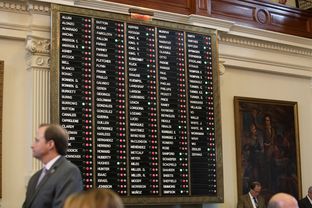Scorecard Season Already in Full Swing

The Legislature has just begun, but the work of picking votes to highlight on a scorecard is in full swing.
On the heels of both the Senate and House voting to increase office budgets for expenses like staff salaries, office supplies and travel, Empower Texans’ Michael Quinn Sullivan announced that members who voted for an increase would be scored negatively on his group’s Fiscal Responsibility Index.
If so, most members are starting off the session with a demerit or two. Twenty-eight senators voted for the increase in their office budgets. Seventy-three House members voted for the increase.
As a quick aside, 77 House members initially voted yes. Four freshman Republicans — DeWayne Burns, Brooks Landgraf, Morgan Meyer and Matt Rinaldi — had reflected in the House journal that they intended to vote no.
And, of course, 128 House members voted to re-elect Speaker Joe Straus, a vote that Empower Texans warned ahead of time would be reflected on the scorecard.
*****
Alongside the announcement that the House was releasing its base budget on Thursday came word that lawmakers won’t have as big of an unpaid bill on Medicaid in the current budget.
Early in every session, lawmakers discuss what kind of supplemental budget they hope to pass. Some have been guessing the figure this time around would be around $1 billion, most of that related to shore up Medicaid.
But House officials with knowledge of budget issues said late Thursday that Medicaid costs are coming in at around $178 million, far less than many had expected. Factor in some other, smaller budget requests and the supplemental may not top $400 million.
This news is surely good news for the House leadership. Over the summer, estimates on the supplemental were high enough to spur some speculation that members might have to break the spending cap.
It would appear, based on these latest figures, that will not come to pass.
*****
Gov. Rick Perry’s records will go to the Texas State Archives, it was announced this week.
That’s a lot of documents. Perry is the longest-serving governor in Texas history, taking office on Dec. 21, 2000, and leaving Tuesday. Slated for transfer, according to the Texas State Library and Archives Commission, are Perry’s legal, legislative, budget and scheduling records.
The records include “more than six terabytes of audio and video recordings and digital images documenting special events, observations, and public appearances.”
In addition, the state archives commission noted that it is embarking on a project to digitize Perry’s records, which consist of more than 7 million pages. Digitization of those records, which would take up to eight terabytes, would be take into 2016 to complete.
For some perspective on that, one website notes that a terabyte would hold 1,000 copies of the Encyclopedia Britannica.
"We are delighted to receive these materials into the state archives," TSLAC Director and Librarian Mark Smith said. "The records of Gov. Perry's historic tenure represent a rich body of resources for researchers as well as the general public."

